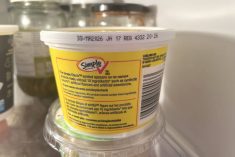More oversight and coordination is needed among federal agencies to prevent unapproved releases of genetically modified crops into the environment and food and feed supply, the investigative arm of the U. S. Congress said Dec. 5.
Since 2000, there have been six known unauthorized releases of GMO crops into the food supply involving GMO corn and rice.
Last month, Monsanto, the leading developer of biotech crops, said some unapproved GMO cotton was harvested. The resulting cottonseed meal may have entered the livestock feed supply.
The Government Accountability Office (GAO) said in a report that more incidents of unauthorized releases could have occurred in the U. S. and simply gone unnoticed.
Read Also

Global humanitarian aid slashed by one-third
Humanitarian aid around the world was cut by a third in 2025 and Canada is one of the culprits.
The U. S. Department of Agriculture, U. S. Food and Drug Administration and U. S. Envi ronmental Protect ion Agency regulate GMO crops.
“As pointed out by GAO, the three regulatory agencies still do not adequately co-ordinate their regulation of the food safety or environmental consequences of these crops,” the Center for Science in the Public Interest, a non-profit health advocacy group, said.
Each agency contends that the unapproved GMO crops that were released have not caused any harmful effects to people, animals or the environment.
But the releases have led to food recalls and lost trade opportunities that economists estimate cost producers millions of dollars, the GAO said.
Lost confidence
“When unapproved genetically engineered crops are detected in the food and feed supply, food safety concerns rise, markets are disrupted and consumer confidence falls,” said Democratic Senator Tom Harkin of Iowa in a statement.
Republican Senator Saxby Chambliss of Georgia agreed that unapproved GMO crops in the market is a problem requiring swift action.
“We must do all we can do to enhance the effectiveness of oversight functions so the technology continues to be available as new products are introduced,” he said in a statement.
Crop developers are subject to periodic inspections, but the GAO says USDA lacks the resources to inspect every site and the EPA has not made inspections a priority. Most of the known unauthorized releases were self-reported by the crop developers, the report said.
To boost oversight, the GAO recommended that the FDA make the results of its early food safety evaluations of GMO crops public. The FDA agreed and said it intends to post the results on its website.
Also, the GAO recommends that the FDA and USDA improve their co-ordination. The GAO suggested developing a formal agreement to share information on GMO crops that could have adverse health implications.
The last recommendation involved all three agencies collaborating to monitor GMO crops on the market.
More than 70 per cent of processed foods sold in the U. S. have ingredients from GMO crops, according to the report. GMO seeds sold in 2007 amassed a global value of US$6.9 billion.
Post-market monitoring
Yet, oversight focuses mostly on crops in the testing phase with little monitoring after crops are marketed. The GAO believes this leaves room for problems with GMO crops approved for the food supply to fly under the radar.
“The incoming Obama administration should implement all of the GAO recommendations, especially one requiring post-approval monitoring for unintended environmental and food safety consequences,” the Center for Science in the Public Interest said. “Resources spent on post-market monitoring would protect consumers, the environment and our trading partners.”
















